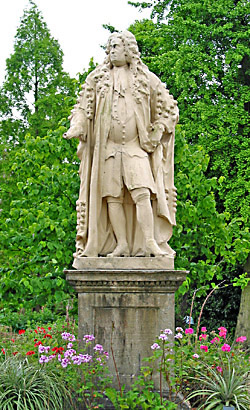Chelsea's
Physic Garden in the mid-1800s
Text
taken from Isabella Burt, Historical Notices of Chelsea,
Kensington, Fulham and Hammersmith, 1871
Note:
What are here called the Botanical Garden at Chelsea is now known
as the Chelsea Physic Garden
The
Manor of Chelsea is a very ancient one, and has passed through
illustrious and noble hands. Henry VIII, Catherine Parr, the
Duke of Northumberland an Anne of Cleves have all owned or
resided here. Sir Hans Sloane purchased the Manor of the last
Viscount Newhaven in the year 1712. Sir Hans Sloane was one
of those men who leave their mark on the age in which they
flourish. He was descended from a Scotch family, but educated
in the North of Ireland. he became an ardent botanist, of
no mean ability; he studied the various branches of physic
successfully; he was president of the Royal College of Physicians;
and he was so great a benefactor of the botanical gardens
at Chelsea that he greatly enriched them with scarce and curious
plants
These
gardens were the third of their kind in England.
The celebrated John Gerarde, the father of English
botany, established the first botanical gardens
in the country. The gardens of Tradescant, at South
Lambeth, were the next. He collected a number of
rare and curious plants. But the whole were given,
in 1667, to the University of Oxford.
The
Botanical Gardens at Chelsea are nearly four acres
in extent. Evelyn, that lover of trees and gardens,
mentions them in high terms in his beautiful Diary.
Various persons of ability managed them, until they
fell under the care of Petiver; he accumulated so
large a collection of specimens of plants, etc.,
that after his death Sr Hans Sloane purchased it,
and it was sent to the British Museum.
It
was at these gardens that he [Sloane] first studied
his favourite science. A statue of him, by the celebrated
Rysbrach, stands in the centre. Sir Hans Sloane was
physician to Queen Anne, and in her last illness he
was called in. He was also the intimate friend of
Sir Isaac Newton. When Sloane purchased the Manor
of Chelsea, he gave a large piece of ground to his
favourite gardens, besides contributing in various
ways to their embellishment.
|

Sir
Hans Sloane's statue in the
Chelsea Physic Garden today. |
Please
also visit Old London Maps
on the web as many of the maps
and views available there have plans and depictions of gardens
from
the medieval period through to the late nineteenth century.
Copyright
© Sara Douglass Enterprises Pty Ltd 2006
No material may be reproduced without permission
unless
specifically stated otherwise
|



